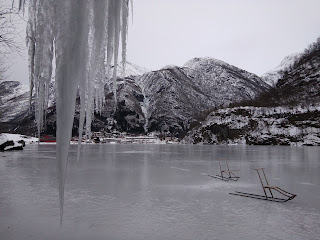When I came home from Sweden in December and entered into a ten-day quarantine before Christmas, I was partly preoccupied with filling up a new book case that my parents had bought for me. It was a long-sought-after opportunity to empty some of the numerous boxes that had been lying around the house in storage after my five years in Denmark - the eclectic library accumulated in the course of a PhD. This brought back a lot of memories from a time that was very different from the constrictions of a pandemic, a time of travelling, and the reading that always follows on travels.
As I read a few dozen books each year, there are several of them that fall out of memory and little of those particular reading experiences has stuck. Others, however, I remember vividly, and some I remember because of where I was when reading them. And a fair number of books from this latter category I remember precisely because of the incongruous pairing of reading material and the place of reading. For instance, I remember reading a translated collection of poetry by Léopold Sédar Senghor, the president of Senegal from 1960 to 1980, while staying at the family cabin in my home village. I remember reading short stories by Fijian writer Raymond Pillai in a small hotel room in Paris. I have vivid memories of finishing the devastating novel Eve out of her ruins by Mauritian writer Ananda Devi in a cold flat in Alicante one December evening, while on my way from Alicante back to Denmark I read a collection of poems from the Norwegian fjords by Wilhelm Bødal. These are combinations of location and reading matter that have become etched into my memory precisely because they do not fit, because they stand out in contrast to one another.
Among these different contrasts, the type that I find perhaps most incongruous is that which happens when reading in an airport. To my mind, airports are distinctly modern half-worlds, pockets of reality that correspond very little with the reality outside them. In this way, it does not take much for airport reading to become incongruous, to become marked my contrasts, to be memorable precisely because something does not fit. One such reading came to my mind as I was organising the new book case, namely the reading of Orosius' Seven books of history against the pagans.
I was reading Orosius in the course of the spring of 2018, as we were having a reading group at the university where I worked then, and because of its compact nature I read this book over several months. I no longer remember where and when I began reading it, and I do not remember where and when I finished it (although judging from my reading list this happened sometime in April-May). What I do remember, however, was an afternoon in March where I was on my way back to Denmark after my first visit to Istanbul. I was sitting by the departure gate for some time, facing a vista of planes taxiing across the tarmac and occasionally picking up the distinct and unexpected sounds of Icelandic teenagers talking somewhere within earshot. The scene was so very different from the reading, which was a seemingly excited recounting of the deeds of Alexander the Great, in which the Christian author Oriosius, who claims to abhor the violence wrought by the pagans of past times, appears to be relishing the opportunity to describe how the Macedonian king jumped over castle walls and single-handedly slaughtered a host of his enemies. It was an incongruous blend of place and reading matter, perhaps made even more congruous by this particular passage, which, in so many ways, stands out as an oddity in Orosius' narrative, conflicting, as it seems, with both his self-proclaimed intention and his vantage point. But incongruities can be memorable precisely because they are incongruous, and in this strange mix of ancient and modern - in which were blended the translated prose of a Spanish fourth-century historian, the view of the Turkish Airline planes, the occasional call over the loudspeaker in Turkish, the chatter in Icelandic along with various other impressions - the reading material fastened in my memory in a way I had not expected, and I have carried this with me for much longer than I spent reading the passage in question, and even longer than it took me to read the book itself.










